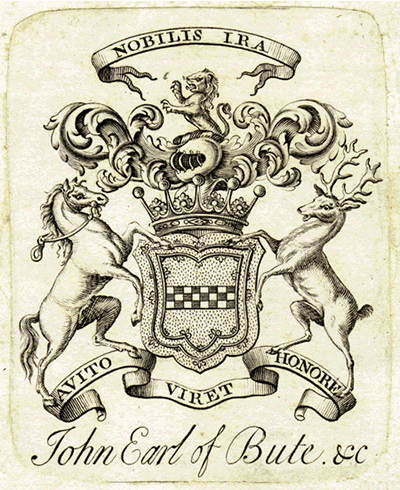|
|
 |
Components of a Complete
Heraldic Achievement
The shield when displayed
with all its surrounding parts is termed a complete achievement.
The achievement shown below, from the bookplate of John, 3rd Earl of Bute,
can be blazoned
as follows:
A shield
supported dexter by a horse, bridled, and sinister by a stag, both proper,
with an earl's crown, helmet, mantle, and crest.
ARMS: or
a fess chequy argent and azure within a tressure flory-counterflory
gules.
CREST: a demi-lion rampant gules with motto scroll above.
MOTTO: Nobilis ira; Avito viret honore.
The above format
for blazoning is that which has been followed in describing the various
armorials which appear in the Bookplate Collection database. In addition
to the illustration below, verbal desciptions of the various components
of the complete armorial are given at the end of
this page. Please note that these descriptions include two components
not illustrated here: the compartment or ground, and medals or chains
from orders of knighthood.
|
|
 |
|
Crest: |
A figure or symbol affixed to the
top of a helmet, usually derived from or relating to the arms on the
shield. The crest sits on the torse, a wreath created by twisting
the primary color and metal together. |
Mantle: |
Derived from the cloth worn over the helmet as protection
from the sun. The outer color is traditionally the primary color in
the arms, while the lining is traditionally the primary metal.
|
Helm: |
Deriving from the helmets worn in battle, the stylized
helm sometimes signifies the rank of the person whose arms it accompanies.
See Crowns,
Helmets, Chaplets & Chapeaux
|
Crown: |
Present only in the achievement of those entitled to
bear it, the crown represents the rank of a noble.
See Crowns,
Helmets, Chaplets & Chapeaux
|
Shield: |
The main part of the achievement, the shield is also called
the coat-of-arms, arms, or armorial. The design of the arms is exclusive
to the individual to whom they are granted, although the arms of individuals
within the same family often are highly similar.
See Instructions
for Blazoning a Coat-of-Arms
|
Supporters: |
Originally decorative in nature, supporters came
to be considered part of a speciffic individual's achievement. They
now appear only in the arms of governments, titled families, and those
in positions of authority. |
Compartment or Ground: |
When an achievement includes supporters
there is sometimes provided a visual element for them to stand upon.
This object may appear as a natural form (eg. a hill) or as a decorative
bracket. |
Insignia: |
A person who had been knighted by one of the various British and European Orders would usually display the insignia of the order (often the collar or badge) around or behind the shield in their armorial. None are present in the example above.
|
Motto: |
Mottos are not exclusive to an individual or family,
but are rather chosen by the individual to express an ideal, goal,
or admonition. They are often in Latin, although not necessarily so. |
|



